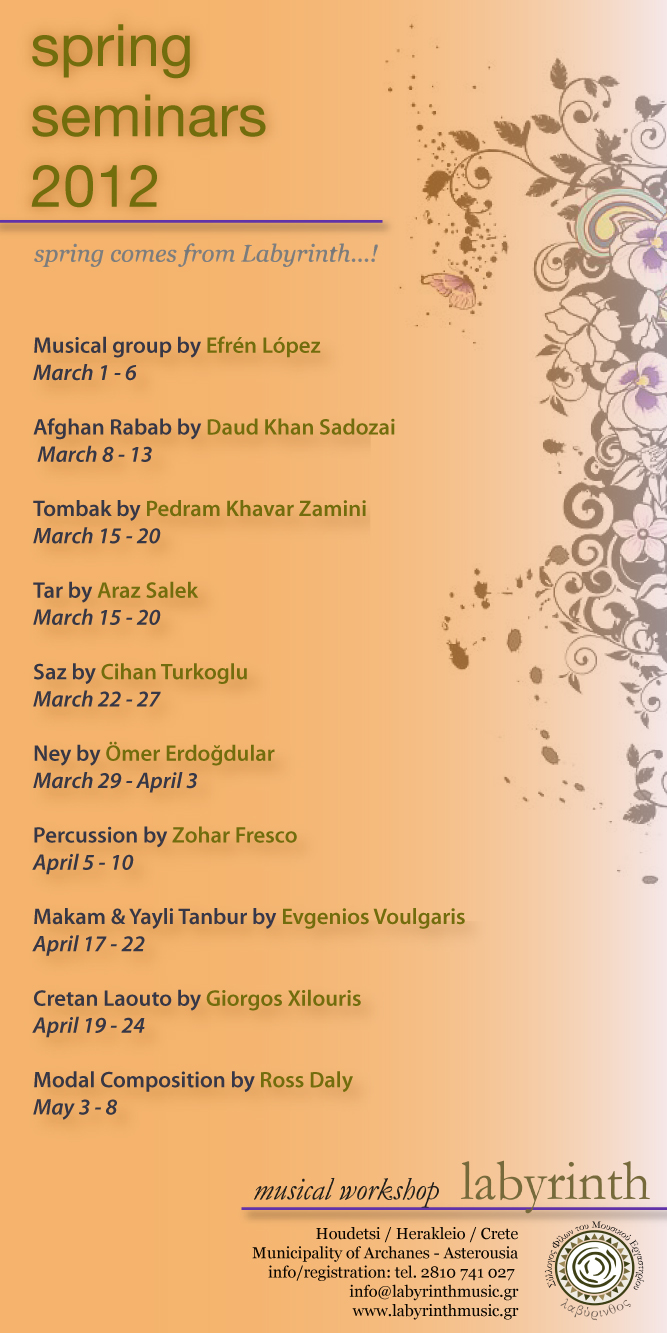http://www.rossdaly.gr/en/biography

Ross Daly Biography
Many years before what we call "World Music" appeared on the scene, certain individuals had already understood the enormous value and vast variety of the world's various musical traditions and had dedicated their lives to their study. One such person is Ross Daly.
Although of Irish descent, Ross Daly does not really fit into any particular ethnic stereotype given that his life has been spend in many different parts of the world and his home for the last 35 years is the island of Crete in Greece. Ross Daly, at a very early age, discovered that music was, in his own words, "the language of my dialogue with that which I perceive to be sacred".
This dialogue eventually led him to the great modal traditions of the Middle East, Central Asia, and the Indian Subcontinent where he finally found the musical archetypes that he had been searching for all his life.
In these traditions he encountered music which was not merely a vehicle of self-expression, but which was able to take one beyond what one normally perceived to be the boundaries of one's self into other trans-personal realms of experience.
This discovery changed everything in Ross Daly's life and he subsequently gave up all other activities and dedicated his life to the study of the innermost secrets of these musical traditions as well as to the art of composition. He subsequently travelled extensively, studying under many of the world's greatest masters of modal traditions. Since 1975 he has been based on the island of Crete where he is universally recognized as one of the foremost experts on the island's rich musical tradition.
He is also especially well known and respected for his ability to bring artists of different and seemingly unrelated traditions together in collaborations of unique quality and depth. In 1982 he established the Labyrinth Musical Workshop which is today situated in the village of Houdetsi 20 kms south of the capital city of Herakleion.
The Musical Workshop Labyrinth (www.labyrinthmusic.gr) is a unique educational institution dedicated to the study of the world's modal musical traditions and every year Ross Daly and his colleagues organize an impressive number of seminars and master-classes which are taught by many of the world's greatest master-musicians.
Each year hundreds of students from all over the world arrive in Houdetsi in order to study with some of the most renowned teachers of modal music from all over the world. Ross Daly's impressive collection of more than 250 instruments which he has collected over the years during his travels is also permanently on exhibition in the building of Labyrinth.
After many years of intensive training in a variety of musical traditions, Ross Daly turned his attention largely to composition drawing heavily on all of the knowledge which he acquired during his long apprenticeships. Today he has released more than thirty five albums of his own compositions as well as of his own arrangements of traditional melodies that he collected during his travels. The island of Crete in Greece still provides a base for his personal and musical research as he continues travelling around the world performing his music...
Today, Ross Daly continues travelling and performing in Greece and abroad whilst simultaneously directing the Musical Workshop "Labyrinth" in the village of Houdetsi on Crete. (www.labyrinthmusic.gr)
http://www.labyrinthmusic.gr/en

http://stigmes.gr/br/brpages/articles/rossdaly.htm
ROSS DALY
There is no difference between a circle and a straight line
Ross Daly is an Irish self-exiled musician, speaking fluently Greek, with an intense Cretan accent due to his long-lasting stay in Crete .
Though he says that he does not have a homeland as he travels often, he has lived in Crete more than anywhere else, 10 years in Chania and 10 in Iraklion . He has established lately a Musical Center at Houdetsi, near Iraklion, including a folkloric instruments museum.
...I deal with musical instruments from when I was 4 years old! My mother is a piano player and initially learned me to play the piano. However suddenly I made my small personal revolution turned in studying the cello till I was 10, then tried classic guitar and so on… Some years later, I began to deal with traditional music, having the first stimuli from San Francisco where I was staying then. It was the ‘60’s and musical tradition of the East, particularly of India , was on the rise. Thus I began to study sitar in England , I started traveling, one thing brings the other, as it always happens …
...my first visit in Greece , was in Crete , where I heard the lyre which impressed me greatly. You know, outside Greece the general impression is that Greek music is only bouzouki, and not even the “right” bouzouki. We listen to sirtaki and the popular songs of '60’s but I consider it has been degenerated. No one knows that there are lyres, lutes, santouri… If you say to a foreigner that the most widespread Greek instrument is the clarinet, you will pass for insane!
… Improvisation is to act musically and experience the moment. This means that to live the moment, you have to leave yourself otherwise you will not succeed. …

No comments:
Post a Comment
All comments are welcome and appreciated by us, as long as they're constructive and objective, but general comments are accepted too. I don't wish to censor or restrict anyone, but desire to learn from everyone and improve the quality of this site. Thanking you all kindly! :-)